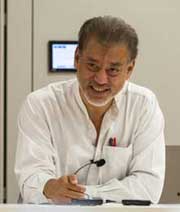Action Delayed, Justice Denied by Voluntary Environmental and Social Governance Approach
KUALA LUMPUR, Malaysia, Oct 25 (IPS) - Policy approaches relying solely on voluntary actions to address urgent needs are unlikely to succeed. Depending on optional compliance to address global warming will not fix things in time.
Regulation for transformation
Tariq Fancy, former Chief Investment Officer for Sustainable Investing at BlackRock, had created a storm with his criticisms of ESG (environmental and social governance) ‘greenwashing’, remaining wary of voluntary corporate-led reforms.

Nevertheless, judicious and effective regulation based on ESG principles, combined with changing incentives and increased public awareness, can incentivize companies to do better.
Fancy believes changing rules for better regulation is essential for better outcomes. Limiting greenhouse gas (GHG) emissions is essential to ensure responsible governance aligned with the long-term public interest.
Investment managers have several responsibilities – including fiduciary duties, legal obligations, and financial incentives – requiring them to prioritize short-term profitability rather than sustainability.
Fancy believes imposing financial costs will provide stronger incentives for corporations to pursue greener alternatives. After all, voluntary measures are rarely enough to ensure sufficient adoption of sustainable practices.
Changing regulations to incorporate sustainability considerations should require portfolio managers to prioritize social and environmental concerns, and make choices supporting long-term sustainability goals.
Profits not aligned with public interest
Fiduciary duties oblige company managers to always act in the best interest of shareholder profits. This means ESG initiatives will only happen if they help, or at least do not hurt, profitability.
Fancy noted managers are not allowed, by law, to sacrifice potential profits from shareholder investments. They are legally obliged to never sacrifice shareholder interests, especially profitability, for anything else.
Social, cultural and media shifts in the West have undoubtedly influenced transnational business behaviour. The popularization of ESG discourses reflects these trends, but there is no strong evidence of their efficacy and positive impact.
Fleeting episodes of public attention cannot even ensure long-term protection of the public interest. With managers constrained by their fiduciary duties, relying on corporations to do the right thing is neither reliable nor sufficient.
Relying on corporate social or environmental responsibility may well become a distraction, delaying urgent and much-needed efforts. This failure underscores the need for government regulation and corporate compliance to achieve vital social and environmental goals.
Quick fixes delay progress
Fancy found many people believe safeguarding investment portfolios from climate risks prevents global warming. But safeguarding finance from climate risks is not the same as mitigating climate change.
De-risking finance means protecting the financial value of an investment portfolio. This includes protecting against asset damage, or reducing the risk of lower investment returns, but certainly not climate change mitigation.
Mitigating climate change requires proactive measures to reduce GHG emissions. This includes measures to generate and use clean, especially renewable energy.
Financial protection is important for financial asset owners, but it cannot replace the efforts needed to fight climate change. Worse, believing such measures address the climate crisis serves to delay government interventions and other changes needed to do so.
Climate inequity
Climate change exacerbates inequality, which in turn delays progress. The intergenerational distribution of the burden of climate risks disproportionately affects younger and future generations.
This deters proactive measures, as older generations are less inclined to spend more now for future generations who will suffer more from global warming. Instead, they may prefer measures to better adapt to its contemporary effects.
Aside from younger and future generations, the more vulnerable will also bear its worst effects. Thus, for example, small farmers in developing nations will have to cope with increased droughts, floods and crop failures.
Thus, further progress on climate change is delayed due to financial short-termist thinking, business interests, limited contemporary accountability for future consequences, as well as political and cost considerations.
Developing nations, with much smaller per capita carbon footprints, typically lack resources, leaving them more vulnerable. Meanwhile, developed countries, the major historical greenhouse gas emitters, have more resources to slow and adapt to climate change.
Can ESG principles help?
Will businesses maintain commitments to ESG ‘principles’ over the long term? They are legally obliged to maximize shareholder interests, especially profits, and also know public interest, attention, sentiment and priorities are always changing.
Business leaders may only commit to ESG principles in the long term if compelled to embrace them owing to the pecuniary costs of ignoring them. Obligations to other stakeholders – including investors, customers and employees – can also help sustain ESG commitments.
Establishing clear governance arrangements for ESG oversight, setting measurable and achievable goals, reporting regularly, and ensuring comprehensive organizational accountability should also help.
But ultimately, regulation should appropriately advance social and environmental responsibility, with such commitments sustained despite shifting public attention, fads and profit concerns.
Are voluntary efforts enough?
The COVID-19 experience has also taught us to prioritize proactive, systemic and mandatory measures, rather than rely solely on voluntary efforts. While voluntary efforts can advance sustainability efforts, the pandemic experience suggests they will not be sufficient to achieve needed changes soon enough.
A systemic approach can induce businesses and individuals to do the needed. Policy interventions, especially regulation, are essential to drive systemic changes on a large scale, and to align businesses and individuals with ESG principles.
Clear communications, transparency and collaboration – among governments, businesses and civil society – are crucial for achieving long-term sustainability and progressive social change.
To control the pandemic, governments adopted ‘all of government’ and ‘whole of society’ approaches, imposing strict mandatory lockdowns, but also providing vaccinations to all, and support to the vulnerable.
Similar top-down approaches may be needed to effectively address social and sustainability challenges. This could involve implementing regulations, standards and incentives promoting, even requiring, sustainable practices.
IPS UN Bureau
Follow @IPSNewsUNBureau
Follow IPS News UN Bureau on Instagram
© Inter Press Service (2023) — All Rights Reserved. Original source: Inter Press Service
 Global Issues
Global Issues